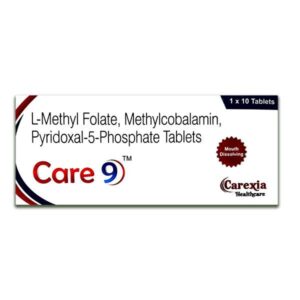CYANOCOBALAMIN + PYRIDOXINE HCI + L-METHYLFOLATE
Cyanocobalamin: Cyanocobalamin is a synthetic form of Vitamin B12. It is used to treat Vitamin B12 deficiency and certain other medical conditions.
The mechanism of action of cyanocobalamin involves its conversion into the active forms of Vitamin B12, known as methylcobalamin and adenosylcobalamin. These active forms are necessary for various metabolic processes in the body, including the synthesis of DNA, red blood cell production, and the proper functioning of the nervous system.
The dosing regimen for cyanocobalamin may vary depending on the individual’s age, condition, and the severity of Vitamin B12 deficiency. Typically, it is administered by injection into the muscle or under the skin. The dosage can range from 1,000 to 2,000 micrograms daily or weekly for initial treatment, followed by a maintenance dose of 100 to 1,000 micrograms monthly.
Common side effects of cyanocobalamin are usually mild and include headache, dizziness, nausea, vomiting, diarrhea, and mild skin rash. These side effects are generally transient and resolve on their own. Rarely, allergic reactions such as itching, swelling, or difficulty breathing may occur, requiring immediate medical attention.
It is important to note that cyanocobalamin should not be used in individuals with Leber’s disease, a hereditary eye disease, as it can cause severe damage to the optic nerve. Additionally, cyanocobalamin may interact with certain medications, such as potassium supplements and certain antibiotics, so it is important to inform your healthcare provider about all the medications you are taking before starting cyanocobalamin.
Pyridoxine Hci: Pyridoxine HCl, also known as vitamin B6, is a water-soluble vitamin that plays a crucial role in various bodily functions. It is available as an over-the-counter supplement and is used to treat or prevent vitamin B6 deficiency.
The primary use of pyridoxine HCl is in the treatment of vitamin B6 deficiency caused by poor dietary intake, certain medications, alcoholism, or medical conditions that impair its absorption or utilization. It may also be prescribed to individuals with certain genetic disorders that affect the metabolism of vitamin B6.
Pyridoxine HCl functions as a coenzyme in numerous enzymatic reactions involved in carbohydrate, protein, and lipid metabolism. It acts as a precursor to the active forms of vitamin B6, pyridoxal phosphate (PLP), and pyridoxamine phosphate (PMP), which are involved in amino acid metabolism, neurotransmitter synthesis, and hemoglobin production.
The recommended daily dose of pyridoxine HCl varies depending on age, sex, and specific conditions. For adults, the typical daily dose is 1.3-1.7 mg. However, higher doses may be required in certain situations, such as during pregnancy or with certain medical conditions. It is important to follow the prescribed dosage instructions provided by healthcare professionals.
Most people tolerate pyridoxine HCl well when taken within the recommended dosage range. However, like any medication, it can cause side effects in some individuals. Common side effects may include mild digestive issues such as nausea, vomiting, stomach pain, or diarrhea. High doses of pyridoxine HCl taken for a prolonged period may lead to neurological side effects, such as sensory neuropathy or skin lesions. It is essential to consult a healthcare provider if any adverse reactions occur.
Pyridoxine HCl may interact with certain medications, including antiepileptic drugs, levodopa, and some antibiotics. It is important to inform a healthcare professional about all medications, supplements, or medical conditions before starting pyridoxine HCl.
Overall, pyridoxine HCl is an essential vitamin supplement used to treat or prevent vitamin B6 deficiency and related conditions. It acts as a coenzyme in various metabolic processes and is generally well-tolerated when used properly.
L-Methylfolate: L-Methylfolate, also known as L-5-MTHF or levomefolic acid, is a medical form of folate, which is a water-soluble B vitamin. It is used as a dietary supplement and prescription medication to treat folate deficiency and enhance the body’s folate levels. L-Methylfolate is also commonly prescribed in cases where there is a need to increase the bioavailability of folate.
The primary mechanism of action of L-Methylfolate involves its conversion into tetrahydrofolate (THF) in the body. THF is crucial for multiple biochemical processes, including the synthesis of DNA, RNA, and amino acids. By providing a biologically active form of folate, L-Methylfolate ensures that these processes occur optimally, supporting cellular function and overall health.
The dose of L-Methylfolate can vary depending on the individual’s specific needs and the reason for its use. Generally, the recommended dose ranges from 1-15 milligrams (mg) per day, as advised by a healthcare professional. It is available in different strengths, including 7.5 mg and 15 mg tablets.
Since L-Methylfolate is a naturally occurring compound similar to the folate found in food, it is generally well-tolerated with minimal side effects. However, some individuals may experience gastrointestinal symptoms such as nausea, stomach upset, or diarrhea. In rare cases, allergic reactions may occur, leading to symptoms like rash, itching, or swelling. If any serious side effects or allergic reactions occur, medical attention should be sought immediately.
It is worth noting that L-Methylfolate may interact with certain medications, such as antiepileptic drugs, methotrexate, and certain antidepressants. Therefore, it is essential to inform your healthcare provider about all the medications you are taking to avoid any potential drug interactions.
In summary, L-Methylfolate is a medical form of folate used to treat folate deficiencies and support various biochemical processes in the body. It helps in the synthesis of DNA, RNA, and amino acids. The recommended dose varies depending on individual needs, and side effects are generally mild and uncommon. However, it is important to consult with a healthcare professional before starting L-Methylfolate to ensure its appropriate use and avoid potential interactions with other medications.

